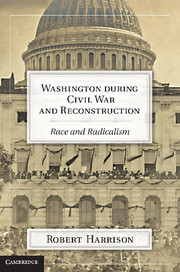Book contents
- Frontmatter
- Contents
- Abbreviations
- Foreword
- 1 Introduction
- 2 Wartime Washington
- 3 The Freedmen's Bureau in the District of Columbia
- 4 Congressional Reconstruction in the District of Columbia
- 5 Reconstructing the City Government
- 6 Race, Radicalism, and Reconstruction
- 7 A City and a State
- 8 From Biracial Democracy to Direct Rule
- 9 Reconstruction in the Nation's Capital
- Index
- References
8 - From Biracial Democracy to Direct Rule
The End of Self-Government in the Nation's Capital
Published online by Cambridge University Press: 05 February 2012
- Frontmatter
- Contents
- Abbreviations
- Foreword
- 1 Introduction
- 2 Wartime Washington
- 3 The Freedmen's Bureau in the District of Columbia
- 4 Congressional Reconstruction in the District of Columbia
- 5 Reconstructing the City Government
- 6 Race, Radicalism, and Reconstruction
- 7 A City and a State
- 8 From Biracial Democracy to Direct Rule
- 9 Reconstruction in the Nation's Capital
- Index
- References
Summary
“Worthy of the Nation”
It is often said that a capital city should serve as an expression of a nation's “self-image” and convey a strong sense of its character and destiny. After the Civil War, many Americans believed that their nation's character and destiny had changed irrevocably. On one hand, with the extirpation of slavery, it had taken on a new commitment to civil rights and a new responsibility for the welfare of the men and women that it had recently emancipated. Thus, during Reconstruction, congressional Republicans used the District of Columbia as a “proving ground” for their policies of black suffrage and equal rights. On the other hand, the nation entered the postwar era with a new sense of the possibilities of federal power and a new awareness of its own strength and importance, forged in the fires of internecine conflict. A victorious and powerful national government required a capital city commensurate with its stature, which Washington evidently was not. Demands such as that made by Harper's Monthly in 1859 for a program of improvements “to render the seat of government worthy of the nation” carried still greater force after the triumph of the Union. Such demands focused on the physical beautification of the capital rather than the attainment of racial justice. When the New York Times suggested in 1870 that Washington should be “a fitting representation of what is best in our national character,” it went on to explain that it should be made into “a model city, not only as regards architecture, but also as regards cleanliness, paving, police, lighting, sewerage and transportation”; it said nothing about civil rights or social justice. Competing visions of Washington's future reflected competing conceptions of national purpose.
- Type
- Chapter
- Information
- Washington during Civil War and ReconstructionRace and Radicalism, pp. 270 - 310Publisher: Cambridge University PressPrint publication year: 2011



